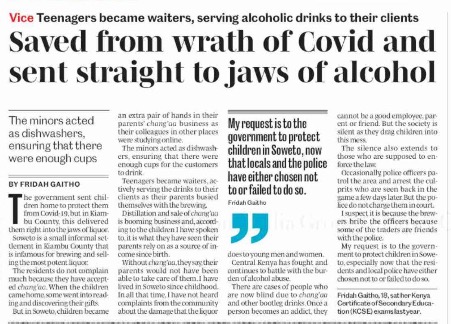According to a report by the United Nations, 166 countries have implemented country-wide school and university closures. More than 1.5 billion children and youth are currently out of schools or universities. This represents 87% of the student population. In addition, nearly 60.2 million teachers are no longer in the classroom. Closure of schools has a wide range of adverse impacts on children and young people, including interrupted learning and foregone human interactions, which are essential to social and behavioral development. Sustained disruption of education could lead to a rise in alcohol and other drug related harm, sexual and gender violence, child marriages and labor.
During the Thirteenth Presidential Address on the Corona Virus Pandemic on November 4, 2020, President, Uhuru Kenyatta, reviewed the previously eased protocols and guidelines and directed that all basic learning classes resume in-person in January 2021. Simultaneously, he reviewed the national-wide curfew to be enforced from 10:00pm and 4:00am. In consequence of this variation of the 10:00pm curfew, all bars, restaurants, and other establishments open to the public must now be closed by 9:00pm.
Children who are exposed to substance use are not casual bystanders and evidence suggests that the impact is far reaching and huge.”
Caroline Kahiu
The big question is: Do these measures protect children and young people from the risks associated with alcohol and other drug use?

According to an article published in the Daily Nation, Fridah Gaitho is concerned that the government sent children home to protect them from COVID-19 but in Kiambu County, this delivered them right into the jaws of liquor. Children who are exposed to substance use are not casual bystanders and evidence suggests that the impact is far reaching and huge. Early exposure to risk factors within their homes, neighborhood, online and media spheres result to early initiation that may lead to addiction and dependency.
In July 2020, the National Authority for the Campaign Against Alcohol Abuse (NACADA) Chairperson, Prof. Mabel Imbuga, noted that consuming alcohol at home undermines the protective home environment for pupils and students who are at home due to the containment measures imposed by the government to stop the spread of COVID-19 infections. Her statement came after the Ministry of Health issued guidelines and protocols restricting the sale of alcohol and the result was an upsurge in online alcohol sales. Conversely, there was an increase of off-license (popularly known as wines and spirits) premises within residential areas.
It is evident that COVID-19 is changing the world in unprecedented ways. Of concern is, its impact on children’s mental and physical well-being. Loss of months of learning, anxiety, depression and stress-related symptoms are likely to occur among children. And with the current postponement of resumption of basic learning classes to January 2021, there is a likelihood that some children might be trapped in homes where alcohol and illicit drugs are commonly used. The risks of exploitation and experimentation are now higher than before. The fate of these children remains unknown and the COVID-19 aftershock on their well-being is yet to be estimated.
COVID-19 is changing the world in unprecedented ways. Of concern is its impact on children’s mental and physical well-being.
This calls for not exposing children to alcohol and illicit drugs and normalizing homes as safe spaces for children to openly talk about their own feelings, fears and anxieties.”
Caroline Kahiu
As the world’s attention is rightly focused on measures to mitigate the transmission of the coronavirus, there is need to focus on children who are experiencing changes in their daily routine. It is prudent to hold social and media conversations on how children will positively cope during these unprecedented times. This calls for deliberate use of evidence-based practices that take into account the children’s developmental framework, the target population and their setting. According to the Universal Prevention Curriculum for Substance Use, key developmental goals are important because if they are unmet, children become vulnerable to falling behind in subsequent developmental goals causing them to likely engage in unsafe and unhealthy behaviors such as alcohol and other drug use.
In addition, there is need to develop and implement evidence-based parenting skills programs to support and help improve parenting styles and skills. Parents need to appreciate that they are their children’s role models and that they shape their behaviors either positively or negatively. This calls for not exposing children to alcohol and illicit drugs and having effective communication that takes into account the child’s age and level of understanding. Normalizing homes as safe spaces for children to openly talk about their own feelings, fears and anxieties will go a long way towards protecting children from substance use during these unprecedented times.
In conclusion, as the UN rightly puts it in their publication Shared Responsibility, Global Solidarity: Responding to the Socio-economic Impacts of COVID-19: This is a defining moment for modern society, and history will judge the efficacy of our response. Therefore, let us normalize protecting our children from alcohol harms for the common good and value that we uphold for humanity.
For further reading
UNESCO, WHO, UNODC: Education sector Response to the use of alcohol, tobacco and harmful substances
Download the PDF here…
WHO, UNODC: International Standards on Drug Use Prevention
Download the PDF here…
